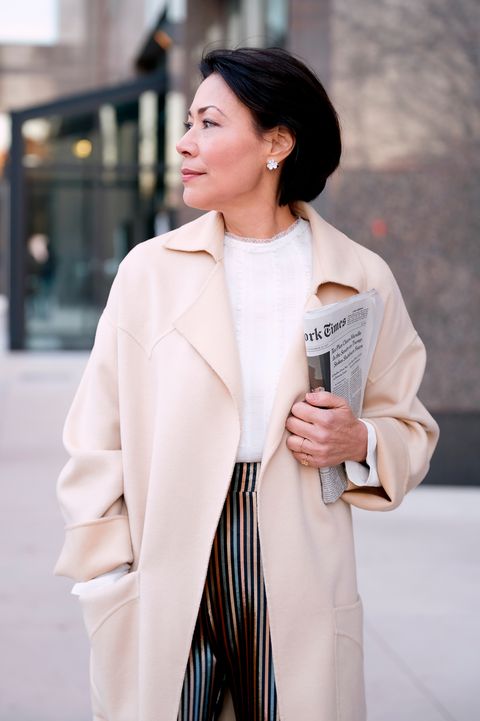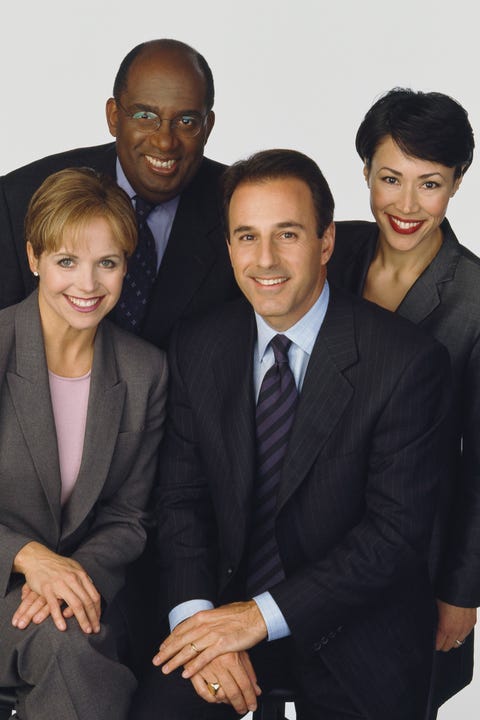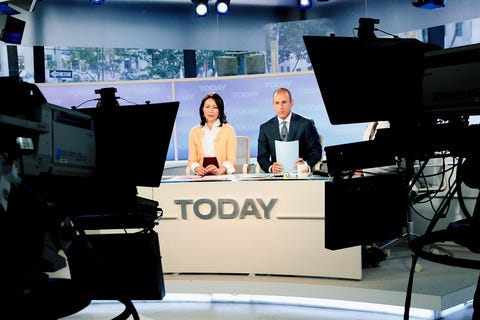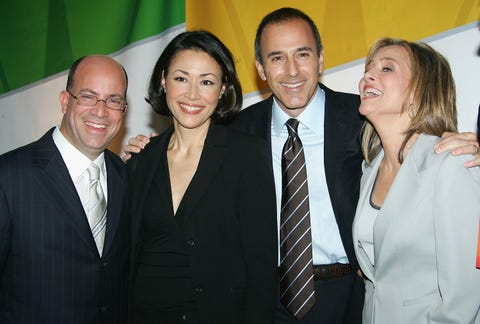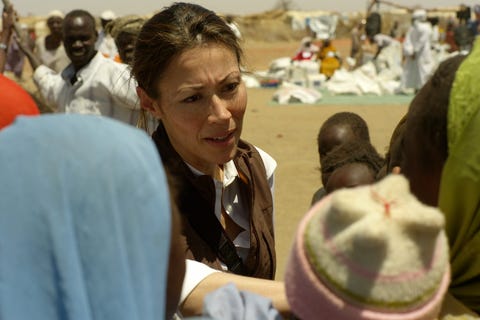During one of the biggest news events in history, one of America’s most prominent television journalists is not in the newsroom. Instead, Ann Curry, the former cohost of the Today show, is spending the COVID-19 shutdown in her Connecticut home, where she’s been in quarantine with her husband, tweeting.
Curry has always been more of a hard-news reporter than a TV personality, and she’s used her days at home trying to pinpoint the most verifiable information about the pandemic to disseminate to her 1.5 million followers. It’s not exactly the gilded celebrity pedestal she once occupied, but like everything Curry does, it’s earnest, honest work. “It’s not as if I want to be on TV talking about this stuff,” Curry assures me. “But I would love to be involved in making sure the right questions are asked. What is it that we have to do to survive this together? It’s better than overeating out of worry.”
On March 17, the week most of the United States grinds to an ominous, screeching halt, Curry finds reason to laugh amid all the bleakness on her timeline. “I’ve had much time to reflect during this COVID-19 crisis & I keep coming back to one thing,” a user named Adam Peters posts on Twitter. “@AnnCurry was royally screwed & deserves the most epic comeback of all time. I’d run into fire for her, drive her around as she eggs NBC execs, or work for her presidential campaign.” Curry retweets the message with a grateful note: “Ok. I will admit you made me laugh, which is esp. appreciated today. Good morning, good morning, good morning Adam.”
In her time at NBC, Curry became an icon for viewers like Peters, who valued the air of old-school journalistic nobility she lent Today. So much so that even in a pandemic, her fans are still ruminating on her untimely departure. And yet, when receiving a compliment, Curry finds a way to temper her reaction with a self-deprecating aside, lest she be perceived as bitter or gossipy. “Good morning, good morning, good morning” is a reference to one of her onscreen gaffes, which became a fixation for Today critics. (Depleted from a tough reporting assignment overseas, Curry once spaced out during a broadcast, greeting the audience three times instead of just once.)
A newshound at heart, Curry—who has won seven Emmys and other prestigious awards for her reporting, including the Medal of Valor from the Simon Wiesenthal Center—is obsessed with the truth. She has “always been a journalist who has wanted information to give people power, and this moment is really all about good, bankable information,” she says of the COVID-19 crisis. The irony is that she can’t seem to pinpoint good, bankable information that might explain what happened to her at Today, NBC News’s crown jewel and morning-news ratings juggernaut, where she occupied the cohost spot alongside Matt Lauer for one brief, awkward year. “I still don’t really understand,” she says. “I know I did nothing wrong. I know I was good at my job.
“They say where there’s smoke, there’s fire,” she continues. “You can read the tea leaves. But you know, I’m a fact-based reporter, so it’s hard for me to go out there, with something so close to the vest. I don’t know. I don’t know.” Her voice grows louder, more exasperated. She believes she can help bring truth to power when it comes to a global pandemic, but not her own professional history. “I don’t know!” she says about her removal, before turning the question back outward: “Why?”
Two weeks prior, before the pandemic confined many of us to our homes, Curry and I meet up for a walk in midtown Manhattan, not far from where the news anchor lives most of the time. Cases of the virus had only just been reported in the United States, and we’re blissfully unaware that this will be one of our final opportunities to roam New York City worry-free. The sprightly news anchor grabs my arm and hurries me toward downtown. As we walk, Curry attracts plenty of attention. Not because she’s one of the most well-known television journalists of the modern era. People are looking at her because of her coat, a Barbie-pink tailored wool jacket that pops out even in the city’s most chaotic sidewalks.
One onlooker asks Curry where she bought it. “Online!” the youthful 62-year-old yells from behind her oversize Gucci sunglasses, smiling and zooming past her admirer. For nearly four straight miles, a seemingly casual jaunt for the indefatigable journalist, Curry only slows down to drop twenties into the hands of the homeless people she passes. Once we arrive at the downtown restaurant where we’ll be having lunch (me, winded; her, energized), the compliments keep coming. “I love your jacket, by the way,” our waitress tells her as she drops menus onto the table. “And I love your smock!” Curry replies cheerfully. “It almost feels like a French workman’s coat.” The waitress smiles. “You get one free if you work here,” she says. Curry notes that she could apply for a job to get the garb.
This is a joke, of course, but it hints at an uncomfortable truth: Curry has sort of been without a job, or at least an appropriately prominent one, for the last eight years. Her role on Today was a dream position that marked the pinnacle of her 30 years in television journalism, the culmination of all the hard work she’d put in as an anchor on Dateline and as a reporter at NBC News. And yet the superlative gig was doomed from the start. Almost immediately, speculation swirled about Today’s tepid ratings; the narrative was that Curry and Lauer just didn’t have the onscreen chemistry needed to sustain the show’s dominance, and Lauer was Today’s prize pony. Within a few months, rumors leaked that Curry would be on her way out. And then, suddenly, she was.
On June 28, 2012, she made her final appearance beside Lauer, telling the audience through tears: “This is not as I expected, to ever leave this couch, after 15 years [at NBC]. But I am so grateful, especially to all of you who watch.” At the end of the farewell, Lauer leaned over to kiss Curry on the side of the head, and she flinched, shrinking away from her colleague’s embrace—a fitting goodbye to a relationship that had long felt unnatural.
This content is imported from YouTube. You may be able to find the same content in another format, or you may be able to find more information, at their web site.
It would take another half decade for viewers to comprehend the complexity of her goodbye. In 2017, Lauer was fired after a female colleague accused him of inappropriate sexual behavior. Days later, the New York Times reported two other women had come forward with similar complaints, and Variety reported additional accusations. These allegations did not fall into the gray zone many #MeToo cases did, but rather painted a portrait of a long and disturbing pattern of sexually manipulative behavior in the workplace. Women accused Lauer of lording his power over them, of once exposing his penis without warning, of making frequent lewd comments, and of gifting an unwanted sex toy. (In late November of 2017, Lauer issued a statement saying that he was “truly sorry” and that not all the allegations were correct, but that “there is enough truth in these stories to make me feel embarrassed and ashamed.” However, in 2018 he wrote to the Washington Post after these allegations were brought up again. “I fully acknowledge that I acted inappropriately as a husband, father and principal at NBC. However I want to make it perfectly clear that any allegations or reports of coercive, aggressive or abusive actions on my part, at any time, are absolutely false.”)
Later, Ronan Farrow’s book Catch and Kill revealed more about the incident Lauer was fired for: a younger colleague alleged that he raped her in a hotel room during the 2014 Sochi Olympics. (Lauer has continually disputed these claims, writing in a May 2020 op-ed for Mediaite that he was “falsely accused of rape,” and that he had a “consensual, yet inappropriate, relationship with a fellow employee in the workplace.”)
Curry was revealed as one of the few powerful NBC employees who weren’t trying to protect Lauer. In 2018, she told the Washington Post that one of Lauer’s accusers had confided in her about her cohost’s behavior in 2012: “I told management they had a problem and they needed to keep an eye on him and how he deals with women.” Curry was in a personal and journalistic bind. She wanted to honor the wishes and confidentiality of her source, but also wanted to flag a blatant abuse of power. She protected the identity of her colleague when she went to NBC executives to issue a warning about Lauer—only to be pushed out of her role. Lauer, in his Mediaite op-ed, issues skepticism about the vagueness of Curry’s description of her conversation with NBC executives—vagueness that stemmed from her desire to protect the accuser’s identity. Since her departure from the network, more female NBC employees have confided in her about Lauer, Curry says.
It would be easy for Curry to give explosive interviews about her former workplace. But doing so would undermine the journalistic ethos she’s cultivated since her early days as a local news reporter in Oregon in the 1970s, where she was the first female reporter at KTVL. (“I was told that women have no news judgment and can’t carry a camera,” she remembers. “It was at that moment that I felt very alone and vulnerable. I thought, ‘I could fail, or I could think about all the women who are still to come.’ ”) Over time, Curry developed an armor of dignity by avoiding gossip, seeking out stories that felt bigger than herself, and protecting her sources at all costs.
“In so many ways, [I’ve had to be] like water between rocks,” she tells me over lunch. “To figure out the path that might help some and not hurt others.” In 2018, she gently nodded in agreement when the hosts of CBS This Morning asked if NBC did indeed have a “climate of verbal sexual harassment,” but she hasn’t elaborated further. “I have no interest in hurting people; my only interest is in figuring out if I can help,” she says. “I was in a position where, as a reporter, I was unable to talk about it. I was asked, ‘Please keep this to yourself.’ I kept that confidence, as I should have. That was tough.”
When I ask Curry about her relationship with her former colleagues, her tone is respectfully chilly. “I still have some friends,” she says. If she is not exactly best pals with the top brass, Curry remains a confidante for many of the women who are still there, trying to sort out their experiences. “There has been more than one [woman] who’s come to me now [about Lauer],” she says. “I hope they’ve come to me because they know that I’ll be empathetic and compassionate. I’m a right-and-a-wrong girl.
“And I’m happy to be their friend,” she adds. “This is a deep level of suffering, from what I’ve learned. They’re dealing with trauma that threatens to be lifelong.”
Curry would like to move on from the single most painful experience of her career. And yet there are reminders everywhere. I ask Curry if she’s watched The Morning Show, the drama inspired by the culture at Today, starring Jennifer Aniston, Reese Witherspoon, and Steve Carell. “I hear it’s good. A number of my friends saw it, and they liked it,” she says. She didn’t watch it, though: “I thought it might make me feel bad.”
When I ask Curry how, in hindsight, she feels about her time at Today, we’re both instantly transported back to her uncomfortable final taping. “I think I’m…um…,” she stammers, chewing painstakingly on her salade Niçoise. “I feel like I’ve done everything I should have done.” She begins to choke up a bit before correcting course. “I’m perhaps earnest to a fault,” she says. “If I had to do it over again, and it meant going through it all over again, to accomplish the kind of reporting I’m really proud of, I would.” What Curry regrets most is no longer being able to do the in-depth reporting on humanitarian disasters that she lived to cover. “The sadness is, those stories, [after I left], stopped being done,” she says. Globally minded geopolitical stories are widely considered to be ratings killers. “There is a higher calling than selling newspapers or TV time,” Curry says. “The internet has threatened the amount of money that major media organizations can make. But if you’re in a service industry, maybe you shouldn’t be making so much money. Maybe [journalism] shouldn’t be a fundraising opportunity for megamillionaires.”
After she was removed as cohost, Curry was given the unofficial title of anchor-at-large at Today, and the title of international and national correspondent for NBC News. She was able to handpick a team of producers and researchers to work on news reports. Still, this didn’t give her the kind of platform she might have expected. In 2015, she severed her partnership with NBC and went on to work on new shows for other networks: PBS’s We’ll Meet Again, about people who’ve been separated by historical catastrophes and then reunited; and TNT and TBS’s Chasing the Cure, about Americans with mystery illnesses. Curry says she’s been approached by cable stations with offers to return to news reporting, but she’s never found good reason to do so. Instead, she’s pouring her energy into smaller, self-directed projects. She speaks at universities; she contributes to National Geographic; she’s doing research for a book.
Suddenly, Curry interrupts our conversation to return to an earlier topic. “I feel I skirted your question, and I don’t like to do that,” she says. “I think because of how I was feeling, I didn’t answer directly. You asked me how I look back on the show. I was feeling deeply, and I needed a moment.
“The bottom line is that it still hurts,” she says. “It honestly hurts really deeply, because I really think I did nothing wrong. But in spite of the pain of it, which still lingers, I know that I contributed to some people suffering less.
“But I tell you, it was tough,” she adds. “It was hard to walk that line, to not add more [suffering]. Boy, oh boy, was it tough.”
Given how the world has changed since our walk, it feels important to check in with Curry over the phone. When I reach her in late March, mid-shutdown, she sounds invigorated. She’s been digging through the mountains of information about COVID-19, and right now she’s amped about a piece she read on DIY ventilators. “I tweeted that to Donald Trump, to Vice President Pence, to Macron in France, to Boris Johnson in England, and said: ‘Hey! FYI. You should be thinking about this,’ ” she says. “Look, I don’t know if any of them are reading my tweets. There is a way to participate in helping people. It’s not just me because I’m a journalist. It’s all of us.”
Once again, I’m reminded that a veteran news anchor, who’s done some of the more important on-the-ground reporting in places like Darfur, Afghanistan, and Syria, is now a card-carrying member of…the peanut gallery. I remember the metaphor she used over lunch, of having to be like water between rocks, when talking about her time at Today. If anything, maybe she can identify what those rocks are, I prompt her. “I mean, it’s been eight years, right? And I think at this point, after all that’s been said and done, it just feels unhelpful, and potentially hurtful, to talk about this. I would say that we all know, especially we women, we know what those rocks are.” For many women, a nondisclosure agreement is a big one. “It’s a rock for a lot of people,” she says. “But I decided a long time ago that I don’t care about that. My biggest concern is not hurting others at the moment. Helping but not hurting—that’s the water between rocks.”
I ask about the “climate of verbal sexual harassment” she’s mentioned in earlier interviews. “Are you asking me if I’ve ever been verbally sexually harassed? Yeah, of course. Who hasn’t? It’s still going on in many places, and it was going on where I worked.”
Then I ask Curry the question that’s been weighing on me since our first conversation: Does she believe that her decision to warn NBC executives about Lauer had something to do with her firing? I expect her to dismiss this inquiry or offer a vague, NDA-compliant line about how all workplaces are inherently complicated. Instead, she allows herself a confession. “I still don’t really understand it,” she says. “If I had known what was happening in the back rooms of power, then I would know. I obviously was not in those rooms.”
There is a general consensus that #MeToo brought many misdeeds to light, a lot of truth into the open. But in the movement’s wake is a host of new questions for women: Did speaking up help me, or harm me? Did this situation change my career path? Did I help the situation, or did I hurt it? Did I do too much, or not enough? “I think that many people have guessed why [I was replaced], but I’ve held myself back,” Curry says. “I’ve asked people why, and I haven’t gotten a good answer.”
But despite the questions that linger in her career, Curry is sure of one thing. “I have no regrets about how I’ve behaved,” she says. “And I’m very proud, in spite of everything, of all the work I was able to achieve.” She pauses for a beat. “I don’t really think about it very often; I really don’t. But when I do, it does hurt still, because it takes time to heal. But what I’ve learned is that you rise stronger.”
This story appears in the September 2020 issue.
